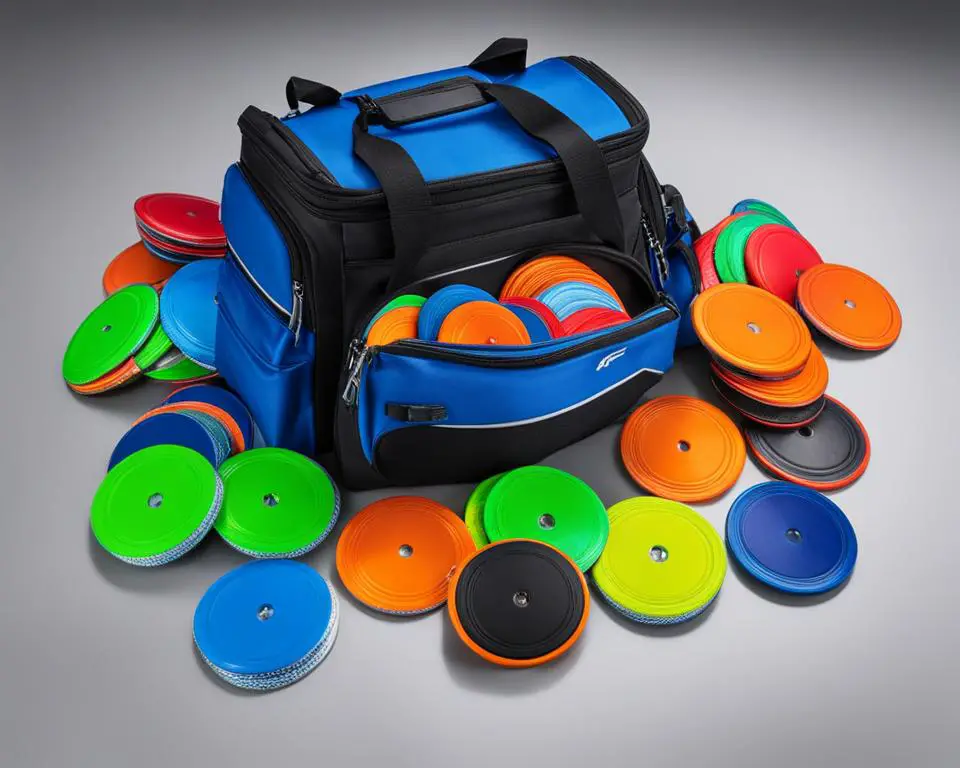Have you ever wondered what goes on behind the scenes of a disc golf tournament? How do players navigate the course, compete for victory, and ultimately emerge as champions?
Understanding How Disc Golf Tournaments Work? opens the door to a fascinating world of strategy, skill, and camaraderie.
Join me as I dive into the intricacies of disc golf tournaments and uncover the secrets behind this exhilarating sport.
Key Takeaways
- Disc golf tournaments encompass various formats and structures, catering to both professional and amateur players.
- Understanding the rules, registration process, and logistics of tournaments is essential for participants and organizers alike.
- The future of disc golf tournaments looks promising, with increasing popularity, inclusivity initiatives, and technological advancements shaping the sport’s landscape.

Introduction to Disc Golf Tournaments
What is Disc Golf?
Disc golf is a fun and exciting sport that’s similar to traditional golf but played with flying discs instead of clubs and balls. Players aim to throw their discs into special metal baskets in as few throws as possible, navigating through a course with various obstacles like trees and bushes. It’s a game that combines skill, strategy, and outdoor adventure.
The Popularity of Disc Golf Tournaments
Disc golf has been gaining popularity around the world because it’s easy to learn, affordable to play, and offers a great way to enjoy nature while getting some exercise. Tournaments are a big part of the disc golf community, bringing players together to compete, have fun, and show off their skills.
Importance of Tournaments in Disc Golf Community
Tournaments are like big celebrations for disc golfers. They provide opportunities for players of all skill levels to test themselves against others, make new friends, and improve their game. Tournaments also help promote the sport, attract new players, and showcase the talents of top competitors. Whether you’re a beginner or a seasoned pro, there’s always something exciting about participating in a disc golf tournament.
Types of Disc Golf Tournaments
Disc golf tournaments come in different flavors, catering to players of all skill levels. Whether you’re just starting out or you’re a seasoned pro, there’s a tournament for everyone.
Professional Tournaments
Major Tournaments
Major tournaments are like the championships of disc golf. They’re the biggest and most important events of the year. Winning a major is a huge accomplishment in a player’s career.
National Tour Events
National tour events are a series of tournaments held across the country. Players earn points based on their performance in these events, with the overall winner crowned at the end of the tour.
Disc Golf Pro Tour Events
The Disc Golf Pro Tour is a series of elite tournaments featuring top players and big cash prizes. These events are broadcasted live, allowing fans to watch their favorite players compete.
Amateur Tournaments
Local Tournaments
Local tournaments are usually held at nearby courses and attract players from the surrounding area. They’re a great way to meet other disc golfers in your community and test your skills in a friendly setting.
Regional Tournaments
Regional tournaments draw players from a larger area, typically spanning multiple cities or states. These events offer a higher level of competition than local tournaments but are still accessible to players of all skill levels.
Amateur World Championships
The Amateur World Championships is the pinnacle of amateur disc golf competition. Players from all over the world come together to compete for the title of world champion in their respective divisions.
Tournament Formats and Structures
Singles Tournaments
In singles tournaments, players compete individually rather than in teams. There are two common formats:
Stroke Play
In stroke play tournaments, players aim to complete each hole in as few throws (or strokes) as possible. The player with the lowest total score at the end of the tournament wins.
Match Play
Match play tournaments involve players competing hole by hole. Each hole is a separate contest, and the player with the lowest score on that hole wins a point. The player who wins the most points overall wins the match.
Doubles Tournaments
Doubles tournaments are played in pairs, with each team consisting of two players. There are different formats for doubles tournaments:
Best Shot (or Best Disc)
In this format, both players on a team throw their discs from the tee. After each throw, the team chooses the best position to continue play from. This continues until the hole is completed.
Alternate Shot
Alternate shot tournaments require teammates to take turns throwing the same disc. One player throws from the tee, then the other player throws from where the first throw landed, and so on until the hole is completed.
Team Tournaments
Team tournaments involve groups of players competing together. Here are two common formats:
Team Stroke Play
Similar to stroke play for individuals, teams in team stroke play aim to complete each hole with the fewest total strokes. The team with the lowest combined score wins.
Team Best Shot
Teams in this format play similarly to doubles best shot, but with more players. Each player throws, and the team selects the best shot to continue play from until the hole is completed.
Understanding these formats can help you decide which type of tournament you want to participate in. Whether you enjoy the challenge of individual competition or the camaraderie of team play, there’s a format for everyone in disc golf tournaments.

Registration and Entry Fees
Registration Process
To enter a disc golf tournament, players must first register. This usually involves filling out a form with personal information such as name, age, and contact details. Registration can often be done online through the tournament website or in-person at the tournament venue. It’s essential to register before the deadline, as tournaments have limited spots available.
Entry Fees and Player Packs
Entry fees vary depending on the tournament’s size, location, and level. They can range from a few dollars for local events to hundreds of dollars for major tournaments. Entry fees typically cover the cost of organizing the event, including course fees, staff, and prizes. In return for their entry fee, players may receive a player pack, which often includes items like a tournament disc, t-shirt, or other merchandise.
Amateurs vs. Professionals: Fee Differences
Amateur and professional players may have different entry fees and player pack contents. Amateur players usually pay lower entry fees than professionals, reflecting their skill level and the prizes they’re eligible to win.
Additionally, amateur player packs might include more beginner-friendly discs and merchandise, while professional player packs might focus more on performance-oriented items. However, both amateur and professional players can enjoy the competitive and social aspects of disc golf tournaments.
Tournament Operations and Logistics
When you participate in a disc golf tournament, it’s important to understand how everything is organized and managed. Let’s explore the operations and logistics involved.
Tee Times vs. Shotgun Starts
Tee Times: In some tournaments, players are assigned specific times to start their rounds. This helps in managing the flow of players on the course and prevents overcrowding. Each player or group knows exactly when they should begin their game, allowing for a more orderly progression through the course.
Shotgun Starts: Alternatively, some tournaments use a shotgun start. This means that all players begin their rounds simultaneously, starting from different holes on the course. It’s like a synchronized beginning, where every player has their own starting point but begins at the same time. Shotgun starts are often used in larger tournaments where many players are involved.
Course Layout and Modifications
Course Layout: Before a tournament begins, organizers carefully design the layout of the course. This includes determining the placement of tee pads (where players start each hole), baskets (the targets), and fairways (the paths between holes). The course layout can influence the difficulty and strategy of the tournament.
Modifications: Sometimes, the course layout may be modified for the tournament. This could involve changing the position of baskets, creating temporary holes, or adjusting the lengths of holes. These modifications are made to provide fair and challenging gameplay for all participants.
Scoring and Scorecards
Traditional Scoring: In disc golf tournaments, players typically record their scores on scorecards. Each hole has a par value, representing the number of throws it should take to complete the hole. Players aim to complete each hole in as few throws as possible. At the end of the round, the total number of throws is calculated to determine each player’s score.
Live Scoring Apps: In modern tournaments, live scoring apps are becoming increasingly popular. Instead of using paper scorecards, players can input their scores directly into a mobile app. This allows for real-time updates on player standings and scores, making the tournament experience more dynamic and accessible.
By understanding these operational aspects of disc golf tournaments, players can better prepare for their participation and enjoy a smooth and organized event.
Rules and Regulations
Basic Rules Overview
In disc golf, players aim to complete each hole in as few throws as possible, similar to traditional golf. Here are some basic rules to remember:
Tee Throws:
- Players start each hole from a designated tee area.
- The throw must be made from behind the tee markers.
Fairway Throws:
- After the tee throw, players must throw from the spot where their disc landed.
- They must maintain balance behind the lie until the throw is complete.
Out-of-Bounds:
- Certain areas on the course may be marked as out-of-bounds (OB).
- If a player’s disc lands in an OB area, they must throw from a designated drop zone or where it went out.
Common Violations and Penalties
Foot Faults:
- A foot fault occurs when a player’s supporting point (usually one foot) moves from behind the lie during a throw.
- Foot faults result in a penalty stroke.
Illegal Throws:
- Players must throw their discs using proper technique.
- Throwing styles such as spinning the disc or using two hands are not allowed and can result in penalties.
Etiquette and Sportsmanship
In addition to following the rules, it’s essential for players to practice good etiquette and sportsmanship:
Respect for Other Players:
- Players should remain quiet and still while others are throwing.
- They should avoid distracting or interfering with other players’ throws.
Course Care:
- Players should help maintain the course by picking up trash and avoiding damage to trees and other course features.
- They should also be mindful of wildlife and other park users.
Honesty and Integrity:
- Disc golf is largely self-officiated, meaning players are responsible for enforcing the rules themselves.
- Honesty and integrity are crucial for maintaining fair play and the spirit of the game.
By understanding and following these rules and practicing good sportsmanship, players can enjoy a rewarding experience in disc golf tournaments while contributing to the positive atmosphere of the sport.

Awards and Prizes
In disc golf tournaments, players have the chance to win awards and prizes based on their performance. These rewards can be exciting and motivating for participants. Let’s explore what players can expect in terms of awards and prizes:
Trophy and Medal Ceremonies
At the end of a disc golf tournament, there is usually a ceremony to honor the winners. The top players in each division receive trophies or medals as recognition for their achievement. These awards are often handed out in front of other players and spectators, creating a sense of celebration and camaraderie.
Cash Prizes vs. Merchandise Prizes
Depending on the tournament’s size and sponsorships, players may receive different types of prizes. In some tournaments, especially professional ones, cash prizes are awarded to top finishers. These prizes can range from a few hundred to several thousand dollars, depending on the tournament’s prestige and prize pool.
On the other hand, many tournaments offer merchandise prizes instead of or in addition to cash. These prizes can include discs, apparel, accessories, and other items related to disc golf. Merchandise prizes allow players to stock up on gear and equipment, adding value to their participation beyond monetary rewards.
Player Ratings and Points
In addition to physical prizes, players may earn points or improve their player ratings based on their performance in tournaments. Player ratings are numerical representations of a player’s skill level, determined by their scores relative to the course’s difficulty and other factors. Winning or performing well in tournaments can lead to higher player ratings, showcasing a player’s improvement and expertise over time.
Future of Disc Golf Tournaments
Disc golf is growing rapidly, and its future looks bright. Let’s explore what might lie ahead for disc golf tournaments.
Growth Trends and Predictions
Increasing Popularity
Disc golf’s popularity has been steadily rising over the past decade. More people are discovering the sport and participating in tournaments. As awareness grows and more courses are built, we can expect even more players to join the community.
Expansion into New Areas
As disc golf gains traction, it’s expanding into new regions and countries. Communities around the world are embracing the sport, leading to the construction of courses in places where disc golf was once unheard of. This expansion is opening up opportunities for more tournaments in diverse locations.
Inclusivity and Diversity Initiatives
Accessibility for All
Efforts are being made to make disc golf more inclusive and accessible to everyone, regardless of age, gender, or physical ability. Organizations are working to ensure that courses are wheelchair-friendly and offer adaptive equipment for players with disabilities. This inclusivity is enriching the disc golf community and encouraging more people to participate.
Diversity in Participation
Disc golf tournaments are becoming more diverse, with players from various backgrounds and demographics getting involved. Initiatives aimed at promoting diversity and equity within the sport are helping to break down barriers and create a welcoming environment for all players.
Technology’s Impact on Tournament Experience
Advancements in Scoring Systems
Technology is revolutionizing the way disc golf tournaments are run and experienced. Digital scoring systems and live scoring apps are making it easier for players to keep track of scores in real-time and for tournament organizers to manage events efficiently.
Enhanced Spectator Experience
With the rise of livestreaming and social media, disc golf tournaments are reaching a wider audience than ever before. Fans can now watch their favorite players compete from anywhere in the world, enhancing the overall spectator experience and fueling interest in the sport.
As disc golf continues to evolve and grow, it’s important to embrace these changes and work towards making the sport more inclusive, accessible, and enjoyable for everyone involved. The future of disc golf tournaments is bright, and there’s plenty to look forward to as the sport continues to thrive.
Conclusion
Disc golf tournaments are vibrant and dynamic events that bring together players of all skill levels to compete, connect, and celebrate the sport they love. From local competitions to major championships, disc golf tournaments offer something for everyone, fostering a sense of community and camaraderie among participants.
As the popularity of disc golf continues to soar, the future of tournaments looks promising. With increasing growth, expanding accessibility, and advancements in technology, disc golf tournaments are poised to reach new heights in the years to come. Through initiatives aimed at promoting inclusivity and diversity, the disc golf community is working to ensure that everyone has the opportunity to participate and enjoy the sport.
Whether you’re a seasoned pro or just getting started, disc golf tournaments offer a thrilling and rewarding experience for players of all ages and backgrounds. As we look ahead, let’s embrace the excitement and potential of disc golf tournaments, knowing that the best is yet to come for this exciting and growing sport.


